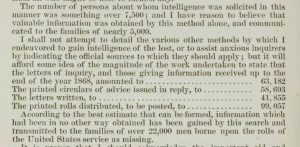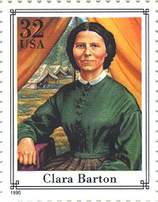This family history researcher knows that Clara Barton is a Memorial Day hero. Her work with the government in the 1800s showed that however slow government agencies may be sometimes, they can be a good source of documentation for us genealogists.
Clara Barton was a smart and powerful force in the honoring of our Civil War dead.
Barton first demonstrated her intelligence as a young child. Born in Massachusetts, she was extremely shy and struggled to become more outgoing during her lifetime. She went on to become one of the most recognized and admired individuals in America of the 19th Century. She was a teacher, a clerk, a nurse, an organizer with dedication and compassion that is still recognized today. In addition to being a nurse in the Civil War, where she was on call to fill the needs of wounded soldiers, she also took on the challenge of caring for the families of the soldiers.
Thousands of Family Letters
The Civil War dead were frequently buried with little ceremony or documentation. Family members struggled to hear news of their sons, husbands, fathers and brothers and often received only silence. Family members wrote thousands of letters to the federal government seeking information on the fate of their loved ones. These letters found their way to the United States War Department and remained unanswered.
When Barton discovered that these letters existed, she immediately set out to remedy the situation. She sent a request to President Abraham Lincoln seeking permission to respond officially to the family inquiries. After permission was granted, her next step was to seek funding from the Senate:
The Search for the Missing Men
“The Search for the Missing Men” began. Barton found an office which she called the Missing Soldiers Office, organized a staff and began searching. She conducted interviews with surviving soldiers when she could. But it was difficult as the war was winding down and men were heading home. She circulated flyers and wrote letters. She spent the summer of 1865 locating, identifying and properly burying 13,000 individuals who died at the Andersonville Prison Camp in Georgia. By 1868, she felt she had done all she could do and the Missing Soldiers Office closed.
In 1869, Barton sent a report to Congress that listed what she had done. She estimated that the Missing Soldier’s Office had a) identified about 5,000 deceased soldiers and b) informed their families. In the report, Barton explained her methodology:
“The fresh memory of each surviving veteran and of every citizen who had watched the last hours of a dying soldier, were the records I sought to consult. But as army after army, and one regiment after another, returned to their homes and were disbanded, it became impossible any longer to hold communication with them except by an extended complex system of correspondence…”
The correspondence that she reported on had included making lists and more lists of known missing men, getting these lists displayed in post offices and printed in local newspapers. Barton’s report notes that most activity took place in 1866.
Letters and More Letters
There were letters, more letters and yet more letters. Clara Barton detailed her activities in her report to Congress: 
Because of address changes in the 1870s, the exact whereabouts of the office were not known for some time. In 2015, a federal employee preparing a house for demolition found a cache of old artifacts and documents that provided more information about Barton and her efforts.
This was a boon for the family history researcher—for information from then and now.
This Memorial Day, remember those who served their country so valiantly and say a prayer for the souls—like Clara Barton—who worked so diligently to make sure that our valiant servicemen would not be forgotten.
When you hire a genealogist at RecordClick, you will find an experienced mix of genealogy researcher services that will find records for your family. Did you have an ancestor who served in the Civil War? Did your family write letters into the government?







